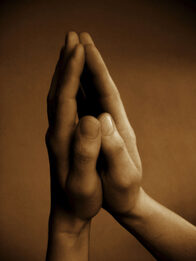
Guest Blog by James K.A. Smith, Editor of Image Journal
I am in the early, ruminative stages of a new book project. I love this phase so much. It's the time when dreaming is work, when you get to be a student again, when progress is less linear and often arrives as a surprise.
For this project (I'll share more in the months to come), I've been reading Thomas Merton's classic, New Seeds of Contemplation. It is a profound, ranging book, though not without its flaws. (Merton's patriarchal assumptions are unsurprising but nonetheless jarring.)
This week, one thread of Merton's reflections has burrowed its way into my psyche: his unique reflections on humility. He is a remarkable diagnostician of various forms of false humility. For example: Merton notes that there is a way of "being humble" that is really just conformity to the expectations of others. But that, he says, is not humility. In fact, "there can be an intense egoism in following everybody else." In other words, sometimes "being humble" (or "acting" humble) in terms of what others expect humility should look like is actually a form of self-interest, an intense desire to be seen as humble.
It is interesting that when he first discusses this, Merton associates the saint and the artist, the monk and the poet. The great temptation for the monk, he says, is to cloak oneself in what one assumes the crowd expects humility to look like. "If they do this job thoroughly," he notes, "their spiritual disguises are apt to be much admired. Like successful artists, they become commercial." These "spiritual disguises" that pass themselves off as humility are anything but; they still have their eye too much on others. At root, this is still a posture of self-interest: I see you seeing me and I want to be seen well. Merton continues:
A clever kind of insolvent servility, a peculiar combination of ambition, stubbornness and flexibility, a "third ear" keenly attuned to the subtlest modulations of the fashionable cliché–with all this you can pass as a saint or a genius if you conform to the right group.
I think Merton's keen insight is this: humility is not comparative. Humility, strangely enough, is not fundamentally a matter of how I look or relate to other people; it is, instead, about the posture of my being toward God. Like Kierkegaard's Abraham, what it means for me (and you) to be humble is somehow utterly singular–a secret, of sorts. Thus Merton cautions that the saint isn't always the one who conforms to our expectation of what it means to be humble.
One of the first signs of a saint may well be the fact that other people do to know what to make of him. In fact, they are not sure whether he is crazy or only proud; but it must at least be pride to be haunted by some individual ideal which nobody but God really comprehends.
True humility, Merton says, can be mistaken for pride precisely because one who is truly humble is answering a singular call that is a secret wrestling of another soul with God. Merton ventures a definition: "humility consists in being precisely the person you actually are before God, and since no two people are alike, if you have the humility to be yourself you will not be like anyone else in the whole universe."

Humility is not pretending to be less than you are; humility is submission to one's utter dependence on God to be who you are called to be. "And so it takes heroic humility to be yourself," Merton says, "and to be nobody but the [person], or the artist, that God intended you to be." And if you do that, "you will be made to feel that your honesty is only pride."
It may seem strange, given our collective assumptions about what counts as humility, but this sort of humility requires courage. It requires a certain kind of refusal of expected norms. It requires courage to answer a call. It requires courage to wrestle with a God others cannot see. It requires courage to detach oneself from the expectations of others and say: this is not about you. "True humility excludes self-consciousness," Merton later observes, "but false humility intensifies our awareness of ourselves to such a point that we are crippled, and can no longer make any movement or perform any action without putting to work a whole complex mechanism of apologies and formulas of self-accusation."
True humility, in other words, starts to sound like liberation. Which isn't to say it's easy.








